
The Jewish Week
By Stewart Ain
January 1, 2020
$4 million UJA-Fed. security effort, beefed-up NYPD presence and calls for National Guard follow Monsey assault.
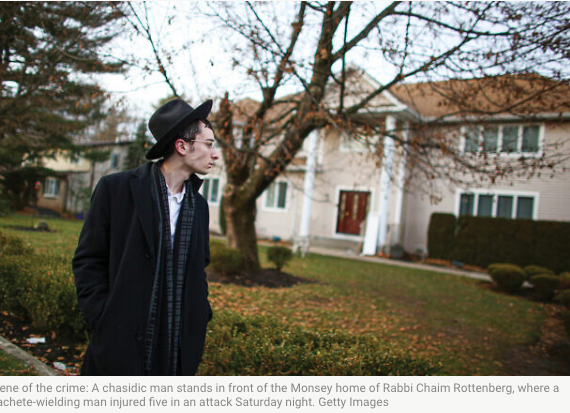
A vicious machete assault at a rabbi’s home in upstate Monsey capped a month of startling anti-Semitic attacks and prompted action by political leaders and Jewish organizations, including a $4 million plan by UJA-Federation of New York, to deploy security experts throughout the area.
“It’s clear that more needs to be done from a security and educational perspective,” said Eric Goldstein, the organization’s CEO. “I just came from a press conference with Sen. [Charles] Schumer where he recommended a quadrupling of the amount of dollars for nonprofit security grants to protect houses of worship and community centers.”
Congress recently appropriated $90 million for security grants — up from $50 million last year — but Goldstein said, “it is clear that is not enough.”
Towards that end, he said security expert Mitchell Silber is being hired to lead a team of six security professionals to help Jewish institutions in the city, Westchester and Long Island bolster their security, access government security funding and enhance communications to create an effective and efficient security network. Silber, who had served as director of Intelligence Analysis for the New York Police Department, will begin work Feb. 3. UJA-Federation is allocating the $4 million for the project.
Silber will work closely with David Pollock, associate executive director of the Jewish Community Relations Council of New York. Pollock said their work presents “an incredible challenge because there are probably 1,500 synagogues, 434 schools, 24 Jewish community centers and four major Jewish museums.”
“There are lots of people who are really good at running [these institutions] but who don’t have an expertise in security,” he said. “We have seen many executive directors who could have spent their security money better and vendors who did not install security protections properly. We work very hard to get the [federal and state] security grants, we want to make sure the money is spent in the best way possible.”
Pollack said Silber’s security team will open regional offices on Long Island, Manhattan/Staten Island, Queens, Brooklyn and Westchester/the Bronx and then have a meeting with all of the Jewish institutions in those regions to learn their security needs.
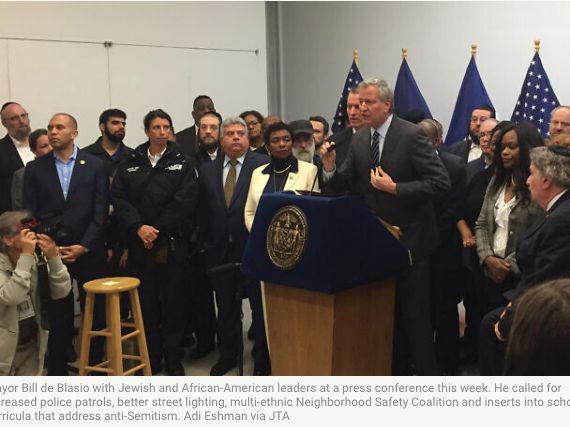
“We are saying you have to know who comes into your building,” he added. “We need to train screening teams, and it’s best when they include volunteers who know the regulars.”
Thirteen anti-Semitic attacks, mostly directed at Orthodox Jews, were tallied locally in December, including the home invasion on the seventh night of Chanukah. Five chasidic Jews were injured in that attack, carried out by a man whose family and lawyer said had a history of mental illness and who police say expressed anti-Semitic views.
The anti-Semitic attacks included the killing of three at a kosher supermarket in Jersey City Dec. 10 by a pair of shooters, one of whom had posted anti-Semitic messages online. Victims in Brooklyn and Manhattan included a kipa-wearing man who was punched in the face and a Jewish man who was punched in the back of the head by an assailant while another filmed the attack. Youths who shouted anti-Semitic slurs threw a beverage on a Jewish man, a Jewish woman was hit in the head while walking with her son, a man threatened to shoot up Chabad’s world headquarters in Brooklyn, and three men shouted anti-Semitic profanities at a crew member of the all-Yiddish “Fiddler on the Roof” as he walked out the stage door.
Frustrated by what David Harris, CEO of the American Jewish Committee, called an “epidemic” of anti-Semitism, Jewish leaders called for action.
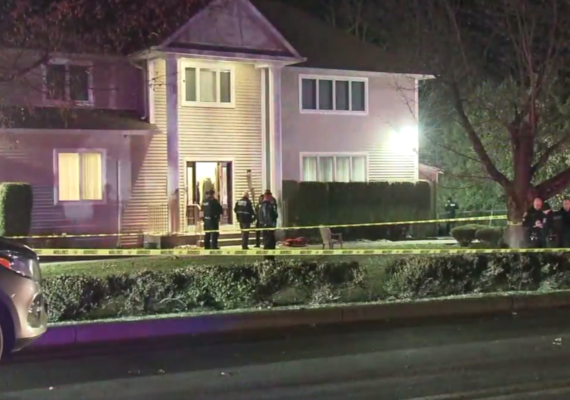
Police outside a rabbi’s home in Monsey, N.Y., where at least five people were stabbed, Dec. 29, 2019. Screenshot from WABC/JTA
“What we need is a stepped up policy, which includes zero tolerance, a get tough message, and a unity of all New York citizens that says this is not just about the Jews or about the chasidic community in Rockland County, this is about all of us and the way we choose to live,” Harris told CNN.
Four Orthodox elected officials in New York wrote to Gov. Andrew Cuomo asking him to declare a state of emergency and to deploy the National Guard and the New York State Police to “visibly patrol and protect Orthodox Jewish neighborhoods throughout the state.”
“It seems like it’s open season on Jews in New York City,” said one of the officials, Brooklyn Councilman Chaim Deutsch.
Cuomo called the Monsey attack an “act of domestic terrorism” and deployed State Troopers in Jewish neighborhoods across the state.
Mayor Bill de Blasio called for increased police patrols at Jewish institutions, better street lighting, Neighborhood Safety Coalitions comprised of New Yorkers from diverse backgrounds, and inserts into the school curriculum that address anti-Semitism.
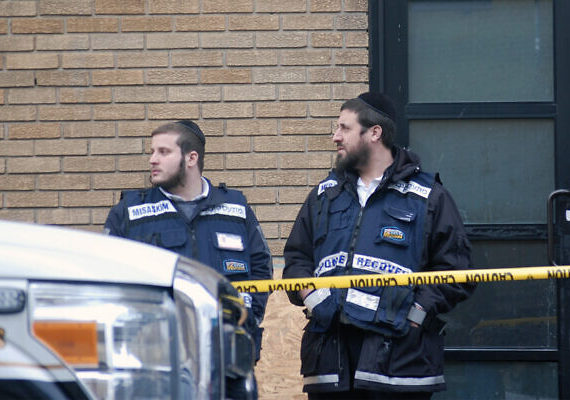
Hasidic members of Misaskim, which provides services for the care of the dead, stand in front of the K’hal Adas Greenville synagogue in Jersey City, N.J., next door to the JC Kosher Supermarket, the site of the deadly shooting that left three dead. Dec. 11, 2019. (Laura E. Adkins/JTA)
Deborah Lauter, the head of the city’s Office for the Prevention of Hate Crimes, said the Neighborhood Safety Coalitions might recruit people who committed anti-Semitic crimes in the past to help educate city youth.
“That’s one of the things we’ve been discussing,” Lauter told The City news outlet. “Particularly kids, they [can] be educated to a point where they then become spokespeople for what they’ve learned and engage their peers in a healthier response when they are feeling frustrated.”
Following the Monsey attack, police on Long Island contacted synagogues to inform them that patrol cars would be monitoring their facilities hourly.
“We want to let them know we are here and ask if there is anything they need to make them feel more safe,” said Sgt. Karen Kolsch of the Fourth Precinct in Hauppauge. “We want to help you protect yourselves so you can live the life you want and not live in fear.”
Demanding More
But some believe more needs to be done.
Rabbi Marvin Hier, dean of the Simon Wiesenthal Center, called on President Donald Trump to create a special FBI task force to deal with nothing but anti-Semitic crime.
“I believe President [Donald] Trump knows this is a serious situation,” said Hier, who delivered a prayer at Trump’s inauguration. “We have to make a dramatic move that says anti-Semitism is a top priority for the U.S.”
He said he has approached Trump with this request “through a very reliable person.”
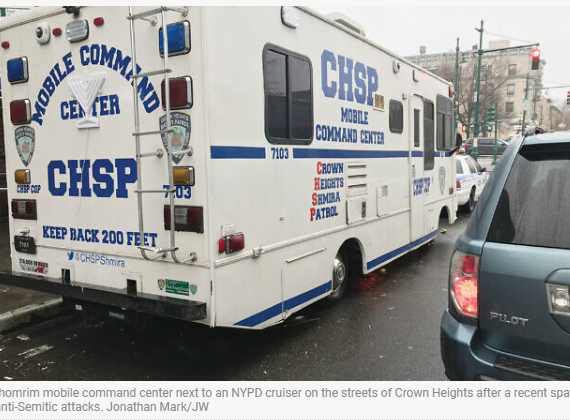
Following the Monsey attack, Trump tweeted that it was “horrific. We must come together to fight, confront, and eradicate the evil scourge of anti-Semitism.”
Dov Hikind, the former Democratic New York State Assemblyman and founder of Americans Against Anti-Semitism, said he would like to see the appointment of a special federal prosecutor to handle nothing but hate crime cases. He noted that the man arrested for the Monsey attack, Grafton Thomas, 37, has been charged with a federal hate crime.
“So far there have been no consequences for those [others] who have committed acts of hate in New York,” he said, citing the case of Tiffany Harris, who last month admitted to police that she slapped three Jewish women and screamed at them, “F-U, Jews.” She was arrested and released without bail in accordance with a new statewide ban on cash bail for misdemeanors and non-violent felonies.
Goldstein of UJA-Federation said that research suggests that one-third of anti-Semitic attacks are being committed by people with a history of psychiatric issues, and therefore “rather than releasing them they should be held for further intervention as needed. And because almost two-thirds of the attacks in the city are committed by juveniles, the city needs to develop additional options for those adjudicated as juvenile offenders, which needs to include supervised community service and education.”
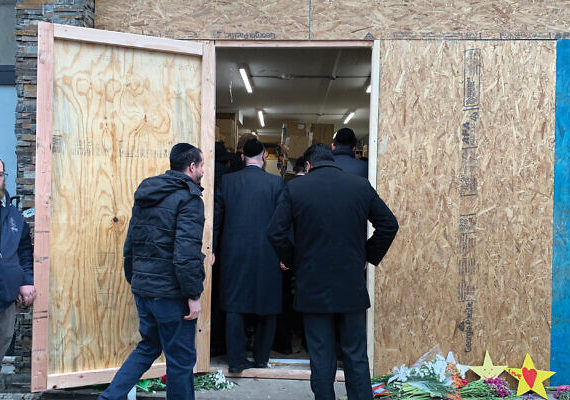
Officials visit the store that was the target of the Jersey City shooting. Shira Hanau/JW
Others noted that many of the attackers are African Americans, and accused lawmakers and activists of ignoring the racial dynamic.
Thane Rosenbaum, a novelist and professor at Touro College, said, “The real problem is the endless reluctance to call this what it is. No one hesitates if it is a white supremacist because they say it’s Donald Trump’s fault. But now they are saying nothing because no one wants to embarrass African-Americans.”
Rev. Al Sharpton, founder of the National Action Network, hosted a news conference Monday with black, Hispanic and Jewish leaders — including Rabbi Marc Schneier of The Foundation for Ethnic Understanding — to denounce the Monsey attack and the spate of anti-Semitic crimes.
Sharpton said he was “terribly disturbed by the recent anti-Semitic attacks on Jews, particularly because they were perpetrated by members of the African-American community. … We in the African-American community know all too well how abhorrent hatred, based on physical appearance or religious observance, is. We cannot now be a part of something that members of our community are doing to other people.”
Jonathan Greenblatt, CEO of the Anti-Defamation League, said on Twitter that the outbreak of anti-Semitic assaults demonstrates that “the Jewish community NEEDS greater protection. Whether worshiping in synagogue, shopping in the supermarket or celebrating at home, Jews should be safe from violence.”
Copyright © 2025 Foundation For Ethnic Understanding. All rights reserved. | Privacy Policy